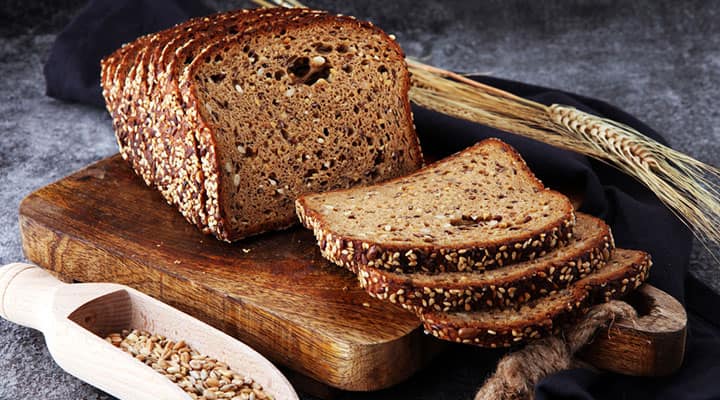
Reasons Why You Might Want to Go Gluten-Free
Published: April 2021
It seems like everyone is going gluten free these days. Supermarket shelves are exploding with products bearing this label, with the market for gluten-free products predicted to grow by more than $2 billion by 2024. We all know, though, how diet trends tend to go in our nation. One minute everyone's avoiding fat; the next, the ketogenic diet, which is very high in fat, is the most popular weight loss trend.
While it is true that gluten could just be another buzz word in some contexts, there are certainly valid health reasons to follow a gluten-free lifestyle.
What is gluten?

Gluten is a mixture of proteins that act as a binding agent, which helps wheat-based foods to maintain their shape and contributes to the texture that we all know and love. As the Latin translation indicates, gluten is the "glue" that gives your bagel that firm, yet elastic texture.
You'll find gluten in wheat, and the grains barley and rye have a similar effect on the body as wheat gluten.
If you don't have any underlying health concerns, you won't find many dietitians telling you to avoid whole grains altogether! In fact, whole wheat and other grains are an important part of a healthy, well-rounded diet. That being said, here are some reasons why you might consider avoiding gluten.
1. Gluten is dangerous if you have celiac disease

The number one reason to avoid gluten—as in all traces of it—is celiac disease. Characterized by an autoimmune response (not an allergy), celiac patients experience destruction of the microvilli in the small intestine when gluten is consumed.
Since the microvilli are essential for nutrient absorption, this can lead to problematic vitamin and mineral deficiencies and an array of adverse health effects that are both digestion and non-digestion related. These effects can be painful and debilitating, which is why celiac patients have to worry about cross-contamination; oats are naturally gluten-free, for example, but if processed in a factory that also manufactures foods with gluten, they can sicken someone who has celiac.
That being said, only an estimated 1% of Americans have celiac disease. So why might the other 99% worry about gluten?
2. You can be sensitive to gluten without having celiac disease

Although celiac disease isn't common, gluten sensitivity, or non-celiac gluten sensitivity (NCGS), affects more people—perhaps yourself included. If you have unexplained fatigue and mental cloudiness, a.k.a. "brain fog," as well as weight gain, abdominal discomfort, skin or digestive issues, NCGS may be the culprit.
NCGS is different from celiac disease in a variety of ways. Most significantly, sufferers may not have to avoid gluten for the rest of their life, depending on various factors, while those with celiac disease absolutely need to stay away from even trace levels of gluten.
You can find out if you have NCGS with a lab test, which will check for a non-allergic delayed immune response characterized by IgG antibodies to wheat, gluten or gliadin. Testing aside, one simple way to find out if gluten is the culprit for your symptoms is to just avoid gluten and see if you feel better! Individuals with NCGS may also benefit from following a low-FODMAP diet.
3. People with wheat allergies need to stay away from wheat gluten
Since you'll find gluten in foods containing wheat, people with wheat allergies will need to eat a largely gluten-free diet (with the exception of certain grains such as barley and rye, which contain gluten but not wheat). Symptoms of a wheat allergy include hives, nausea, headaches, congestion and asthma—and, in rare but serious situations, anaphylaxis. You'll note that some of these signs overlap with signs of celiac—but, they are not the same.
If you're concerned about a wheat allergy, you should reach out to a board-certified allergist for testing, treatment and prevention.
4. Gluten may worsen leaky gut syndrome

Your doctor may have told you that you have a condition called "leaky gut" if he or she suspects the lining of your stomach is unhealthy. The standard American diet is thought to worsen leaky gut syndrome—and if you're an all-American eater, chances are your diet is chock full of gluten. (Drinking alcohol and high stress levels also may play a role.)
It's common for a practitioner to suggest removing inflammatory foods from your diet if they suspect leaky gut syndrome… and gluten is likely on that list. Leaky gut is also associated with autoimmune diseases, and patients with those diagnoses are often told to avoid gluten.
5. Gluten is a no-no if you’re on a keto or paleo diet

Avoiding gluten is common in those who are following two very popular ways of eating: the ketogenic diet and the paleo diet. With keto, your goal is to get your body into a state of ketosis, which requires high fat intake, moderate protein intake and minimal intake of carbohydrates—think vegetables and low-sugar fruits, not a brownie.
The paleo diet also restricts grains—instead, people get their carbohydrates from things our paleolithic ancestors ate, such as fruit and nuts. If you want to be faithful to either of these diets, you're going to need to give up on (or limit) gluten.
Are there any downfalls to avoiding gluten?
The biggest downfall to a gluten-free diet is just that it's hard to do it! Gluten is hidden in a variety of packaged and processed foods. (Of course, people who suffer from celiac disease have to comply, because even the smallest quantities of gluten can cause distress.)
Could you suffer a nutritional deficiency if you don't eat foods with gluten? Possibly: packaged gluten-free foods that aren't fortified during processing can mean you'll have a lack of B-vitamins in your diet. But that shouldn't be a deterrent for those who choose to limit gluten. Simply taking a high potency B-complex would help ensure an adequate B vitamin intake!
The bottom line is this: gluten itself is not "unhealthy," and indeed, whole grains can be part of a healthy diet. For those with specific health concerns, though, or limiting gluten intake may be helpful—or even necessary.
If you suspect gluten may be problematic for you, work with your doctor and a dietitian-nutritionist for individualized guidance.
References
- Veraverbeke, Wim S et al. "Wheat protein composition and properties of wheat glutenin in relation to breadmaking functionality." Crit Rev Food Sci Nutr., 2002, https://pubmed.ncbi.nlm.nih.gov/12058979/
- Kreutz, Johanna M et al. "Narrative Review: Nutrient Deficiencies in Adults and Children with Treated and Untreated Celiac Disease" Nutrients, February 2020, https://pubmed.ncbi.nlm.nih.gov/32075276/
- Asri, Nastaran et al. "The Gluten Gene: Unlocking the Understanding of Gluten Sensitivity and Intolerance." Appl Clin Genet., February 2021, https://pubmed.ncbi.nlm.nih.gov/33603437/
- Vici, Giorgia. "Gluten free diet and nutrient deficiencies: A review." Clin Nutr., December 2016, https://pubmed.ncbi.nlm.nih.gov/27211234/
- Caio, Giacomo. "Effect of Gluten-Free Diet on Gut Microbiota Composition in Patients with Celiac Disease and Non-Celiac Gluten/Wheat Sensitivity." Nutrients, June 2020, https://pubmed.ncbi.nlm.nih.gov/32575561/
- "Gluten-free Food Market Growth to Grow by $3.19 Billion during 2020-2024." Technavio, October 2020, https://www.businesswire.com/news/home/20201028005977/en/Gluten-free-Food-Market-Growth-to-Grow-by-3.19-Billion-during-2020-2024-Technavio
- "Celiac Disease: Fast Facts." Beyond Celiac, 2021, https://www.beyondceliac.org/celiac-disease/facts-and-figures/
- "Wheat Allergy." American College of Allergy, Asthma & Immunology, 2021, https://acaai.org/allergies/types/food-allergies/types-food-allergy/wheat-gluten-allergy
Always be in the know!
Access the latest deals, wellness news, expert health tips & more!




